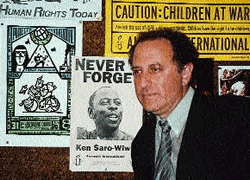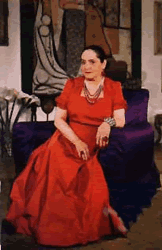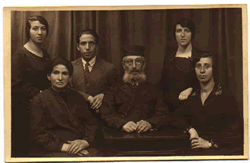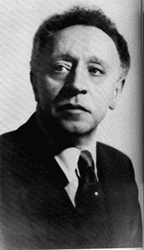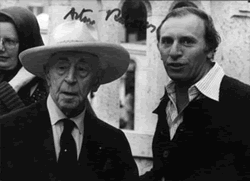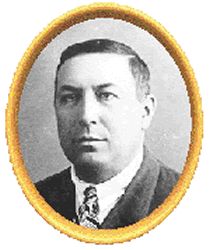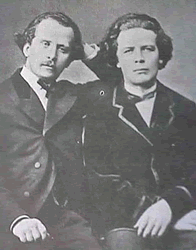"What I learned at Columbia was that I was a Menshevik," reflects Rubenstein. "I had sympathy with the [demonstrators'] cause, but I parted company with their actions. Carrying a stretcher was the right thing to do."A native of New Britain, Conn., Rubenstein fondly recalls his academic pursuits at Columbia, especially a seminar with Lionel Trilling '25 and his decision to study Russian.
"I always knew that I wanted to study a foreign language with a different alphabet," he says. "I thought that by learning Russian â€" no matter what else I studied at Columbia â€" I would leave with something concrete that I would have for the rest of my life."
Rubenstein did not know at the time, however, how his study of Russian would affect the rest of his life. During a six-week language tour of the Soviet Union in 1970, he met an artist in Leningrad whom he would eventually profile, and it was this piece that convinced the editors at the Boston Phoenix to hire him as a book reviewer specializing in Soviet issues."At the time," Rubenstein recalls, "there were very few of us reviewing the literature being produced by Soviet writers, especially dissident writers, and that's what led to my first book."
Soviet Dissidents, Their Struggle for Human Right (1980) launched Rubenstein's career as a "professional student of Soviet history" and led him to a position at Harvard's Davis Center for Russian Studies. His follow-up work, Tangled Loyalties: The Life and Times of Ilya Ehrenberg (1996), was a widely praised biography of a Stalin-era writer/journalist that took more than 13 years to research and write.
"It took a number of trips to Moscow to complete that book," Rubenstein says. "When I first started working on the book in 1982, I could barely get in the country or get anyone to talk to me, but by the time I made my last trip in 1990, things had relaxed so much that I was asked to give a lecture series!
"I am most proud of that book," he adds, "and its theme, a Jewish topic."This theme would be repeated in Rubenstein's most recent work, Stalin's Secret Pogrom: The Postwar Inquisition of the Jewish Anti-Fascist Committee, published in May. Rubenstein edited and helped translate the transcript of the secret trial of 15 Jewish intellectuals and authors in Moscow that ended with their execution in August 1952 on what has become known as "The Night of the Murdered Poets."
The subject matter of Stalin's Secret Pogrom could not have been more appropriate for Rubenstein: not only is it Soviet history, but it's also a study of the violation of basic human rights, a topic to which he dedicates his professional life as Northeast regional director of Amnesty International, USA.
Rubenstein stresses that his grass-roots organization plays a vital role in combating human-rights abuses domestically as well as globally. "In addition to organizing U.S. citizens to write letters about international issues," he says, "we want to make them aware of issues in our country like police brutality, the treatment of women in prisons and the death penalty."
Rubenstein, who lives in the Boston area with his wife and son, joined Amnesty International in 1975 as a volunteer because he "was interested in politics and it seemed that Amnesty had a balanced and sensible approach to political problems." Today, Rubenstein is one of the organization's two longest-serving employees and is responsible for overseeing the operations of its branches in New England, New York and New Jersey.
"My primary task is to organize Amnesty chapters at local high schools and colleges," he says, "as well as to do some fund-raising and work with the media. I am proud of my contribution and look forward to seeing what comes next."
Rubenstein, Helena: Founder of namesake cosmetic business and beauty salons
Szeroka Street in Kazimierz, the old Jewish quarter of Krakow was the birthplace of Helena Rubenstein. Her name may not be familiar to the younger generation but in the 1950s, her line of cosmetics was one of the most popular in America; her sweet-smelling Heaven Sent perfume was a favorite of many college co-eds and is still available, although hard to find.
#rbstn-5 & #rbstn-6:
The splendid piano virtuoso
Arthur Rubinstein enjoyed tremendous popularity from the time of his
debut at the age of 12. Though born in Poland, Rubinstein lived for
much of the time in Paris and Berlin when not touring the world.
Rubinstein was one of the first pianists to use the then-new medium
of electronic recording, committing nearly his entire repertoire to
vinyl. His command of the musical literature was vast, and included
Chopin, Beethoven, Brahms, Schubert and Schumann.
As we learn of his many historical achievements, keep in mind that Rubinstein had a nervous disorder known as anthrophobia (fear of people and society) for his entire life. His poor mental health was clearly an extremely difficult disability for him to contend with and caused him enormous suffering throughout his life. But, in spite of his disability, Rubinstein was able to compete brilliantly for many years with the best chess players in the world and his games are studied and treasured to this day.
In 1910, when Schlecter challenged Lasker for the World Champion title, many considered Akiba Rubinstein to be the best chess player in the world. In those days the challenger to the World Champion was required to raise the money and finance the match. The World Champion alone would decide which challenger to play and this was largely based on the funding available. Rubinstein never had a chance to play for the Chess World Championship but he was considered the strongest chess player who did not have the opportunity to compete for the title.
In 1912, Rubinstein won tournament after tournament: he won five consecutive International tournaments and the year was dubbed the Rubinstein year, this had never been done before in the history of chess! Fifty years later Bent Larsen won 5 tournaments in a row, however it took him three years to achieve this while Rubinstein won at San Sebastian, Pistyan, Breslau, Warsaw and Vilna all in the same year.
Everybody demanded a match between Rubinstein and Lasker, clearly the only player who was close to Rubinstein in strength. Sadly, this match never took place. The beginning of deep psychological problems that eventually turned into full-fledged mental illness, the appearance of the Cuban chess genius Capablanca, and the advent of World War I all combined to dash his championship hopes.
In 1914 Nicholas II, the Czar of Russia, organized a tournament in St. Petersburg and invited all the greatest players in the world. The top five finishers would be given the title "Grandmaster". Tragically, Akiba Rubinstein failed to qualify in the top five. Though he remained one of the world's strongest players until about 1921, his pathological shyness and the erosion of his confidence led to a gradual disintegration of his powers. After World War I, Rubinstein continued to play in tournaments with moderate success but he did not revisit his former high level of play until he won the Vienna tournament in 1922, ahead of Alexander Alekhine and Richard Reti.
Rubinstein's style formed a bridge between the styles of Steinitz and the players of today. A mastery of openings, a deep understanding of the consequences of different types of pawn structures, and a skill in the endgame that has never been surpassed, were all part of his repertoire. Most notable, however, was his ability to connect the openings he played with the kinds of endgames that could be reached from them. This incredibly deep planning is commonly seen in modern champions, but it was virtually unheard of in Rubinstein's day.
Among the chess players who deserve our highest reverence, Akiba Rubinstein stands out as a unique contributor to chess. His noble career and life of great suffering stands as a beacon of light to all who study the game of chess as well as those who study life itself. Today, Rubinstein's games are carefully studied by all the finest players. His moves and concepts still seem fresh, his handling of the endgame is still remarkable, and his opening ideas are still all the rage.
After 1932, Rubinstein never competed in chess tournaments again, although he was invited to do so. His lifelong struggle with his mental health worsened and he spent time in a sanitarium. However, there was a bright side to this because it is possible that this protected him from the Germans during World War II and he was left alone. He spent his final years until his death in 1961 with his family in Belgium.
www.chess-poster.com/images/ rubinstein.gif
Anton Grigorievich Rubinstein
(1829 -1894) Not to be confused with the great pianist Artur Rubinstein, born in 1887, Anton Rubinstein, an even greater performer in his time and a clear rival to Liszt and other great pianists of the 19th century, had a marked effect on the development of music in Russia, establishing the first system of professional musical training at a new Conservatory in St. Petersburg in 1862. His brother Nikolay set up a similar institution in Moscow. The Conservatories were not welcomed by the nationalist composers, who regarded them as a German intrusion, although the Rubinsteins were Russian, if of German-Jewish extraction. As a composer Anton Rubinstein was prolific, writing, as his brother suggested, enough music for both of them. His very technical facility told against him so that by the time of his death his work was not properly valued by supporters of Russian musical nationalism.
Rubinstein wrote seventeen operas. These are no longer part of general repertoire, but excerpts from the fantastic opera The Demon and the opera Feramors may be heard occasionally in concert extracts.
Rubinstein's orchestral compositions include six symphonies, of which the second, "Ocean", is the best known. He wrote five piano concertos and other works for piano and orchestra and concertos for both violin and cello.
As prolific here as in other forms of music, Rubinstein wrote a number of string quartets, three violin sonatas and two cello sonatas, in additon to other chamber works, none often heard, except possibly the sonata for viola and piano, a useful addition to an otherwise exiguous repertoire for the viola.
Rubinstein, as a leading virtuoso of the instrument, wrote a quantity of music for the piano. Of all the sonatas, suites, serenades and other pieces, the Melody in F remains notorious in its popularity.
http://www.karadar.com/Dictionary/rubinstein.html
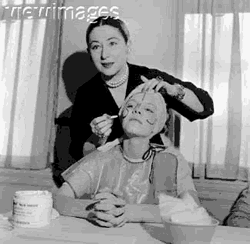
#rbstn-9:
Helena Rubinstein
born in Krakow (now in Poland), on December 25, 1870, the oldest of eight
children of Augusta (Gitel Szeindel nee SILBERFELD ) and Naftali Herz
(Horace) Rubinstein. She briefly studied medicine in Switzerland and immigrated
to Australia in 1902. She noticed that the Australian women had rough
reddish faces that required cosmetic attention. Rubinstein opened a modest
shop in Melbourne where she dispensed her "Creme Valaze" and
instructed women individually on how to care for their skin. She worked
long hours and her shop prospered. In 1908, her sister Ceska joined her
and took over the management of the shop as she went to London with a
$ 100,000 to start what would become an international organization. She
met Edward Titus, an American journalist in London, and they were married
in 1908. They had two sons, Roy, in 1908, and Horace in 1912. They lived
in Paris and when World War I started, they moved back to the United States.
She opened beauty salons throughout the country where her skin care and
her creams were in demand. The department stores were clamoring to sell
her products. Rubinstein was a brilliant innovator in developing her business
so that it required routines and women. She trained sales people to teach
women skin care and devised a diet plan for beauty. She inaugurated a
"Day of Beauty" in her salons which became an instant success.
She understood and appreciated the value of advertising and she made full
use of it in developing her business. She divorced her husband in 1937
after a shaky marriage for the past ten years. She married Prince Artchil
Gourielli-Tchkonia. a Georgian prince twenty years her junior, in 1938.
She developed a line of male cosmetics which bore his name. He died in
1956 and her son, Horace, died two years later. Rubinstein was very much
concerned and interested in the welfare of Israel. She was very generous
with monetary contributions. She founded the Helena Rubinstein Pavilion
of Contemporary Art in Tel Aviv where her collection of miniature rooms
is housed. The Helena Rubinstein Foundation, created in 1953, provided
the necessary funds to organizations concerned with health, medical research
and rehabilitation. The Foundation also supported the American Israel
Cultural Foundation and awarded scholarships to Israelis. Rubinstein hated
small talk and was very frugal. She carried a bag lunch to work with her
although she was a very, wealthy woman with over millions of dollars worth
of the masters in art and sculpture. Despite her frugality, she bought
her clothes from the top fashion designers in the industry. Her top executives
in the business were relatives as she was very family oriented. In 1959,
she went to Moscow where she officially represented the cosmetic industry
in the United States at the American National Exhibition. Helena Rubinstein
was always involved with her organization and even when her health was
failing, she carried on from her sick bed. She died in New York City on
April 1, 1965. Her philanthropy, material support for Israel and her enhancement
of women looking and feeling more beautiful will long be remembered. This
is one of the 150 illustrated true stories of American heroism included
in Jewish Heroes & Heroines of America : 150 True Stories of American
Jewish Heroism, © 1996, written by Seymour "Sy" Brody of
Delray Beach, Florida, illustrated by Art Seiden of Woodmere, New York,
and published by Lifetime Books, Inc., Hollywood, FL. Source: Jewish Heroes
and Heroines in America.
From Helenas' family tree;
http://www.ics.uci.edu/~dan/genealogy/Krakow/Families/Silberfeld.html
Zalel (Sale) SILBERFELD 1816
| ! | m:Rywka SCHIFF 1811-12 (Szai + Chaia FRENKEL)
| ! | ! married Feb 18, 1834 #12
| ! | !x Schaja SILBERFELD Feb 6, 1835 #151 - 1836 #179
| ! | !x Lazar SILBERFELD Feb 22, 1836 #66 - 1837 #177
| ! | !? unnamed SILBERFELD Jan 5, 1838 #9
| ! | !x Baruch Mojzesz SILBERFELD Dec 19, 1838 (1839 #2)
| ! | ! m:Hanna Reisel PITZELE May 1, 1839 #232 (Jakob Szymon + Tylle
BONAT)
| ! | ! married Sep 27, 1860 #344
| ! | !x Jozef Hirsch SILBERFELD Dec 17, 1840 #523
| ! | ! m:Sali CEMBICER?? c1849 Krakow
| ! | !x Wolff Berl SILBERFELD Nov 3, 1842 #480
| ! | ! m:Hanna SILBERFELD Jun 22, 1839 #304
| ! | ! |o Eva SILBERFELD c1869 Krakow - 1947 Australia
| ! | ! |o Gitel Witte SILBERFELD 1871 #290/#586
| ! | ! | M:Dawid Leib RAKOWER 1872 #758
| ! | ! | married 1893 #145
| ! | ! |x Jechiel Schachne SILBERFELD 1873 #3 - Feb 5, 1888 #37
| ! | ! |x Baruch SILBERFELD Jan 12, 1874 #107 - Jul 27, 1937 Amsterdam
| ! | !o Gitel Szeindel SILBERFELD Aug 11, 1844 #426
| ! | ! M:Naftali Herz RUBINSTEIN b. Dukla
| ! | ! | bann 1902 #126
| ! | ! |o Helena RUBINSTEIN ??Dec 25, 1870 Krakow - Apr 1, 1965 NYC
| ! | ! | M:Edward Morganbesser TITUS
| ! | ! | ! married Jun 7, 1908, Sydney, Australia
| ! | ! | !x Roy Valentine TITUS Dec 12, 1909, London - Apr 16, 1989 NYC
| ! | ! | !x Horace TITUS c1912, London - Apr 1958 NYC
| ! | ! | M:Prince Artchil GOURIELLI-TCHKONIA Feb 18, 1895, Georgia, Russia
- Nov 21, 1955 NYC
| ! | ! | married 1937 NYC
| ! | ! |o Rachel RUBINSTEIN Dec 13, 1874 (1875 #56)
| ! | ! | M:Jochene OPPENHEIM
| ! | ! | ! bann 1903 #208
| ! | ! | !o Giselle OPPENHEIM c1900
| ! | ! |x Wolf Ber RUBINSTEIN Apr 18, 1876 #677
| ! | ! |x Hersz Dawid RUBINSTEIN Jul 1877 #503 - Oct 27, 1877 #467
| ! | ! |x Aron RUBINSTEIN Oct 27, 1878 #704 - May 31, 1884 #243
| ! | ! |o Rywka RUBINSTEIN Oct 28, 1879 #768
| ! | ! | M:Mojzesz Dawid KOLIN
| ! | ! | ! bann 1904 #220
| ! | ! | !x Henry KOLIN ??c1898 NY
| ! | ! | !o Mala KOLIN ?Dec 31, 1905 Krakow - Jul 22, 1999 NYC
| ! | ! | !x Oscar KOLIN ?Feb 3, 1908 NYC - Nov 25, 1995 NYC
| ! | ! | !o Rachel KOLIN ?May 28, 1910 NYC - Sep 18, 1989 Israel
| ! | ! |x Abraham RUBINSTEIN Dec 21, 1880 #787 - Jul 13, 1881 #389
| ! | ! |o Sara RUBINSTEIN Feb 12, 1882 #100
| ! | ! |o Cyperla RUBINSTEIN Dec 21, 1883 #807
| ! | ! |o Ester RUBINSTEIN Feb 14, 1886 #119
| ! | ! | M:Max MICHELSON
| ! | !o Rachel Feigel/Rozalia SILBERFELD Jun 1, 1846 - 1918
| ! | ! M:Mojzesz/Maurycy BECKMANN Nov 15, 1843 #539 (Berl + Sussel)
| ! | ! | married Jan 14, 1883 #12
| ! | ! | FAMILY LISTING
| ! | !x Izaiasz/Szaia SILBERFELD Mar 7, 1848 #79 - 1850 #159
| ! | !x Szaje Heschel SILBERFELD 1850 #336
| ! | !o Raicza (Reizel) SILBERFELD 1851 #405 - 1918
| ! | ! M:Markus RUBINSTEIN
| ! | ! |o Rywka RUBINSTEIN Mar 12, 1881 #138
| ! | ! |o Sara RUBINSTEIN Jun 17, 1882 #414
| ! | ! |x Wolf Beer RUBINSTEIN Mar 9, 1884 #174
| ! | ! |x Dawid RUBINSTEIN Mar 5, 1886 #181
| ! | ! |x Eizyk Jakob RUBINSTEIN Oct 8, 1887 #698
| ! | !o Chaja Gele SILBERFELD - 1941 Holland
| ! | !x Leibel SILBERFELD Nov 29, 1852 #539
| ! | !o Braindel SILBERFELD Apr 11, 1854 #198
| ! | !o Eva SILBERFELD c1855
| ! | !x Arje Leib SILBERFELD c1856
| ! | !x Jakob Herz SILBERFELD c1858 - 1913 NY/Antwerp?
| ! | ! m:Caroline WEINER
| ! | ! |o Regina SILBERFELD Sep 28, 1890 Melbourne - Mar 1988 Nevada
| ! | ! | M:Aron (Arthur) SILBERFELD ?Apr 29, 1876 Krakow - 1938 NYC
| ! | !o Berta SILBERFELD c1866
| ! | !x Dawid SILBERFELD ?1871 #618
| ! | ! M:Leibisch SPLITTER - 1941 Holland (Izak Majer + Rifka)
| ! | ! bann 1903 #136
| !
http://www.ics.uci.edu/~dan/genealogy/Krakow/Families/Silberfeld.html
#rbstn-10:
Ariel Rubinstein is a professor
at the School of Economics of Tel Aviv University and at the Department
of Economics of Princeton University, and a winner of the "Pras
Israel" (Israel Prize) 2002 for his achievements in the field of
economics. http://arielrubinstein.tau.ac.il
Democracy, obedience and refusal - by Ariel Rubenstein 21/01/2004
The Jewish ethos, to the best of my knowledge, does not include reverence
for obedience to human beings. Our ethos, like that of many other peoples,
I think, is full of heroes who refused to obey. How would you relate
to a new hero of Israel who sees evil and injustice, but nevertheless
continues to obey because this is the will of the majority?
March 12, 2002, Hertzelia, May 19, 2002, Tel Aviv.
The lecture was delivered in Hebrew and has been translated by Ira Moskowitz.
A few words about democracy----
 Sometimes we confuse the spirit of democracy with its procedural
aspects. To my mind, democracy is an approach to making collective decisions
aimed at finding the middle ground, honestly and with mutual respect,
that reflects the wishes and perspectives of the individuals in a society
in which the vast majority accept for themselves a common fate, mutual
commitment and constitution -- not necessarily a legal one, but, more
importantly, a cultural one. A democratic procedure is a mechanism
aimed at realizing a minimal threshold of the spirit of democracy. Of
course, no mechanism can guarantee that a society's actions will be
democratic is spirit. There is no guarantee that a majority of people
will not decide -- in a legal and procedurally correct manner -- to
blatantly violate what others hold sacred. All in all, Israel
maintains democratic procedures. But I have doubts about its democratic
spirit. There is, of course, the case of Israel's non-Jewish citizens,
who have been systematically deprived for over 50 years, the proper
result of a democratic procedure that has perhaps expressed the wishes
of the overwhelming majority of Israelis. In the religious-secular conflict,
particularly during recent years, the two sides (including the secular
side) have tried to impose their wishes through the democratic mechanism,
without granting appropriate legitimacy to the cultural constitution
of the State of Israel. In 1982, we embarked on a war of choice despite
the fact that the spirit of democracy demands that this kind of war
be waged only if it is backed by a nearly unanimous consensus. This
is because a war initiated by the majority requires the minority to
kill and be killed. And, most relevant to our discussion here, is my
view that the majority -- and certainly not the minority -- has no right
to obligate us all to be full partners in ruling over another people
for 35 years. The cultural constitution of the State of Israel
specifies that it is a Jewish state. Personally, I am a proud son of
the Jewish people and would like my children to live only in a Jewish
state. For me, and for many of us, being Jewish does not mean being
religious. We are driven by perhaps a biological instinct of continuity.
I feel obligated toward the Jewish tradition and the national ethos,
as we all experience it. I am here as a response to my wish to live
with my people amidst a feeling of continuity, identity and belief that
we have many things in common that I would like to share. The
Jewish ethos, to the best of my knowledge, does not include occupation.
On the contrary, it leads me to identify with those suffering under
occupation and to feel disdain toward the occupier and oppressor, even
when the occupier and oppressor is me. Our cultural constitution does
not give us the right to be a people who occupy another people against
their will -- and for such a long period of time. It is important to
clearly emphasize that for many of us this is a fundamental principle
that we relate to in exactly the same way as a religious Jew relates
to the basic prohibitions of Jewish law. No procedural democratic decision,
even if made by a large majority, can take away the right of a religious
Jew to maintain his faith and his notion of what it means to be Jewish.
In the same way, no procedural decision, even if made by an absolute
majority, can force us to be occupiers. There was a time when
we deluded ourselves into thinking that the territories were essential
for our security and constituted a bargaining chip for peace and all
sorts of other ridiculous things. It's difficult to understand now how
reasonable people like us once believed these things. After 35 years,
the only choice we can really make is whether or not to continue to
rule over another people. As one of the signatories to the ``New Officers'
letter'' said, ``Ruling over another people is not an option for the
Jewish people.''The Jewish existence requires putting an immediate and
unilateral end to ruling over another people, regardless of any terror,
ceasefire, political implications, and chances for peace. I would choose
this option even if I were convinced that the result of such a withdrawal
would increase the personal risk against our lives. I am aware
that there are those who have similar thoughts, but draw opposite conclusions.
To many of these, I only feel the need to say, ``Look, I'm a thoroughly
secular person, but I value the great importance of the Jewish people's
continuity in its religious tradition as well. Thus, I agree with you
that the State of Israel must also preserve its Jewish character, even
when this entails religious aspects that contradict my personal lifestyle.
But I expect that you will also understand that I also have things pertaining
to my Jewishness that I cannot give up.'' And if the religious Jewish
public and the national secular public, to which I belong, do not agree
with this cultural constitution, no parliament or court is capable of
completing this work. This is not an absolute limit of democracy, but
rather of Jewish society in general. Doesn't a democratic society require
obedience? The Jewish ethos, to the best of my knowledge, does
not include reverence for obedience to human beings. Our ethos, like
that of many other peoples, I think, is full of heroes who refused to
obey. How would you relate to a new hero of Israel who sees evil and
injustice, but nevertheless continues to obey because this is the will
of the majority? It seems to me that I have even heard advocates of
obedience express admiration -- perhaps justifiably so -- toward a certain
general because he knew when not to obey commands. We have a
small mix-up here between the obligation to obey something I reject
and the requirements of ``responsibility'' and solidarity that underlie
our cultural constitution. You don't have to be a soldier in the Gaza
Strip to share this responsibility. All of us are responsible for what
is happening here and there, regardless of whether we serve or refuse
to serve in the armed forces exercising Israeli rule. Unwillingness
to revere obedience is not equivalent to irresponsibility or anarchy.
I don't honor the obligation to obey, but, of course, I believe in responsibility.
And, if I might add, the obligation of responsibility is what is under
threat here. Thus, for example, we don't care and don't do a thing while
knowing that more than 10 percent of breadwinners in Israel return home
from a day of work without a minimum wage or minimal social benefits.
Am I in favor of refusal? I don't feel that I have any right
to say anything to those who must decide between the dictates of their
conscience and their obligation toward their friends and the unpleasant
experience of sitting in prison. I've only twice been confronted with
this dilemma. During my regular army service (1970), I found myself
participating in a search from one ramshackle home to another in a refugee
camp in the Gaza Strip. We went in, searched, and rummaged throughÂ
the few belongings we found. One woman looked at us with a proud and
scorn full _expression. So, in response, we went back and trashed her
house. I felt no dilemma. I went back and trashed. I tell this unimportant
story and understand how much the little animal lurks also in me.Â
And nine years ago, opposite Dehaisheh, when my views were already different.
I didn't refuse to serve in the occupation. I thought about it. I wanted
to see once how it looked from the inside. I was afraid of the attention
and the hassle of a trial and prison. I had other things in mind. At
that time, I refused to take charge of Palestinian prisoners. This didn't
bother anyone. In any case, they were most interested in finding someone
to patrol the road at night and this was ``okay'' because it was meant
to save lives. All in all, I arranged things for myself so that somehow
I would avoid the difficult questions. I have no right to say a word
about refusal. The only thing that I can say is that I regard
this group -- called ``refuseniks'', but whom I would call ``the Neturei
Karta of the Jewish conscience '' -- as the heroes of Israeli society
in 2002. Not only them, but also the young people who are sacrificing
their worlds to take command responsibilities and confront moral dilemmas,
who are serving in the IDF not out of an obligation to follow orders
or because of a democratic decision, but rather amidst a daily internal
struggle between what is permissible and prohibited, between the demands
of reality and the raising of a black flag. I admire both of these groups.
On the other hand, ``I don't admire'' (to put it mildly) those who rule
over another people because ``they were told'' to do so, or those who
do not see any problem in this. But, Israel's main problem in 2002 is
not a refusal to serve in the occupying forces, but rather the danger
that many of us will reach the conclusion that we refuse to bear the
responsibility for what goes on here. We are all partners, whether we
like it or not, in ruling over the territories and we all have the right
to ask whether we want to be a part of this. A refusal to be
a part of this society is certainly most legitimate from a legal perspective.
And no democratic law can prevent this type of refusal. While the current
refusal derives from a feeling of concern, responsibility and readiness
to bear an oversized share of the burden, this other type of refusal,
which is ostensibly more legitimate, is actually more threatening. I
can say to myself that I personally will remain here, no matter what,
and at best I'll even try here and there to influence others to stop
this terrible thing. I feel fully entitled to say to my children, aged
16 and 9, that their fate is to be here even if this state faces horrible
existential dangers. And you don't need special connections with the
head of the Shin Bet to imagine that it is very possible that during
their lifetimes they may face more terrible scenarios than those we
have experienced. But, woefully, I tell myself that I have no way to
explain to them that they must tie their lives to a pseudo-Jewish state
that is determined to continue ruling over millions of other people,
a state that has contempt for the very history that established it.
Even if they accept the obligation to a state that sends them to rule
over millions of another people, they and their friends will still have
the right to refuse to be part of this. Personally, the thoughtÂ
that they, and those like them, are liable to choose not to be here
scares me to tears.
Spouse: Sarah BRODIE-ASHKENAZI
Children:
Salomon RUBINSTEIN Spouse: Gittel SCHIFF
Children:
1. David Zvi RUBINSTEIN Spouse: Pesel HOROWITZ
Mordechai RUBINSTEIN
Born: 1844, Zolkiew
Died: Y
Spouse: ? KAHANE
Spouse: Reizel SILBERFELD
Born: 1848, Cracow
Died: 1918
Children:
David Zvi RUBINSTEIN (Children: Rivke (Regina) RUBINSTEIN ,
Mordechai (Mark) RUBINSTEIN ,Baruch RUBINSTEIN Died: 1974, Israel
)
Naftali RUBINSTEIN
Leah RUBINSTEIN
Stella RUBINSTEIN
Wolf Ber RUBINSTEIN Died: Cracow.
Isaac RUBINSTEIN Born: 1888. Died: 1944. Spouse: Dreizel FRANKEL Children:Simon
RUBINSTEIN , Rivke RUBINSTEIN
Judah RUBINSTEI
2. Aryey Lieb RUBINSTEIN children;Simha Rubinstein, Rebecca Rubinstein,
Horace Naftali Hirsch RUBINSTEIN Spouse: Gitel Augusta SILBERFELD Born:
Caracow Married: Abt 1865, Krakow, Children: Helena RUBINSTEIN Born: 25
Dec 1870, Cracow. Married: 1938, New York, N Y. Died: 1 Apr 1965, New
York City.
Children:
Roy TITUS Born: 1909, Londres. Died: Y. Children: Helena TITUS, Living.
Roy Valentine TITUS Born: 12 Dec 1909, London. Married: Abt 1955. Died:
18 Apr 1989, New York City. Spouse: Marie BEHR Born: Abt 1912 Married:
Abt 1940, New York, Ny Died: 1956 Children: Helena TITUS, Living.
Horace TITUS Born: 1912, London, England. Died: Apr 1958, New York, Ny.
Spouse: Evelyn SCHMETKA, Living Children: Toby TITUS, Living. Barry
TITUS, Living.
Pauline RUBINSTEIN Born: Abt 1874, Krakow, Austria. Married: Abt 1890.
Died: Paris, France. Children: Marcelle HIRSCHBERG Born: Abt 1892. Married:
Abt 1915.
Rachel RUBINSTEIN Born: 13 Dec 1874, Krakow, Austria. Died: Y.
Regina RUBINSTEIN Born: Abt 1876, Cracow. Married: Abt 1897. Died: Y.
Children:
Leon KOLIN
Henry KOLIN Born: Abt 1898. Married: Abt 1920, New York, Ny. Died: Toronto,
Canada.
Mala KOLIN Born: 31 Dec 1905, Cracow. Died: 22 Jul 1999, New York City.
Oscar KOLIN Born: 3 Feb 1908, New York, N Y. Married: Abt 1930. Died:
25 Nov 1995, Ny Hospital, Ny.
Rachel KOLIN Born: 28 May 1910, New York, N Y. Married: Abt 1932. Died:
18 Sep 1989, Kibbutz, Israel. Spouse: Chaim Langzaam SHALEV, Children:
Uri SHALEV, Living.
Carmi SHALEV, Living.
Nurit SHALEV, Living. Gisele OPPENHEIM Born: Abt 1900. Married: Abt 1920.
Wolf Ber RUBINSTEIN Born: 1876, Krakow, Austria. Died: Y.
Stella RUBINSTEIN Born: Abt 1877, Krakow ( Austria). Married: Abt 1899.
Died: Y.
Herz David RUBINSTEIN Born: 1877. Died: Y.
Aron RUBINSTEIN Born: 1878, Krakow, Austria. Died: Y.
Rifka RUBINSTEIN Born: 1879, Krakow, Austria. Died: Y.
Abraham RUBINSTEIN Born: 1880, Krakow, Austria. Died: Y.
Sara RUBINSTEIN Born: 12 Feb 1882, Cracow. Died: Y.
Cecilia (Ceska) RUBINSTEIN Born: 21 Dec 1883, House #2 Ul. Szo, Krakow,
Austria. Married: Abt 1900. Died: Abt 1967, London, England.
Manka RUBINSTEIN Born: 1885, Krakow, Austria. Married: Abt 1895. Spouse:
Bernard IMMERDAULER Born: Abt 1875, Vienna ( ?)Married: Abt 1897, Vienna,
Austria ( ?)Children: John BERNARD Born: Abt 1899. daughter; Patricia
BERNARD, Living Spouse: Fred DE_LAURA
Erna (Ester) RUBINSTEIN Born: 14 Feb 1886, House #18 Ul. Sz, Krakow, Austria.
Married: Abt 1905. Spouse: Max MICHELSON
3. Sarah Leah RUBINSTEIN Spouse: Isaiah Abraham BUBER Died: 1870, Lvov
( Ukraine Children: Simha BUBER, Moses BUBER , Salomon BUBER Born: 2 Feb
1827, Lyon. Died: 1907. Children: Kalman BUBER Children:
Nelly BUBER , Martin BUBER Born: 8 Feb 1878. Died: 14 Jun 1965.
Spouse: Paula WRINKLER Died: 1958 Children:Rafael BUBER, Eva BUBER
